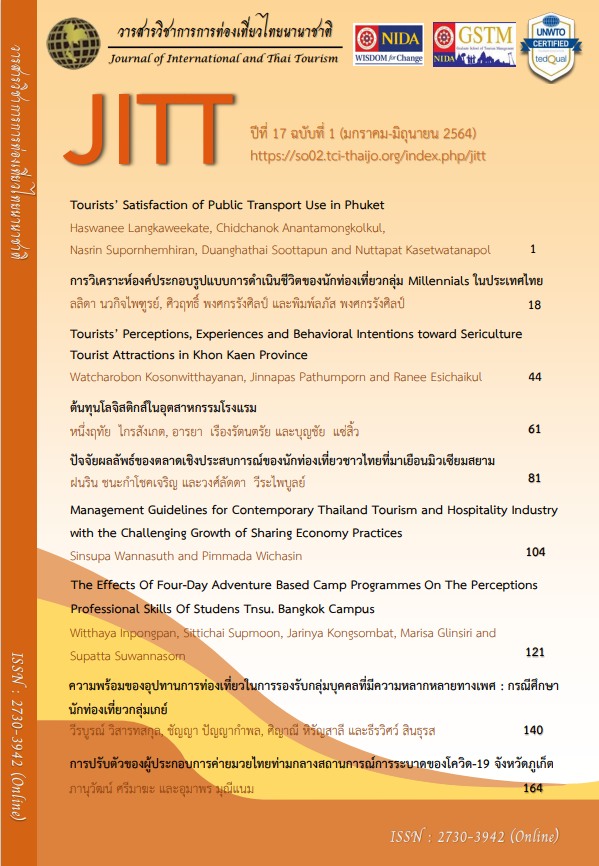ความพร้อมของอุปทานการท่องเที่ยวในการรองรับกลุ่มบุคคลที่มีความหลากหลายทางเพศ: กรณีศึกษานักท่องเที่ยวกลุ่มเกย์
Main Article Content
บทคัดย่อ
การวิจัยชิ้นนี้มีวัตถุประสงค์เพื่อศึกษาและวิเคราะห์สถานการณ์ องค์กร และภาคส่วนต่าง ๆ นโยบายและกฎหมาย และผลิตภัณฑ์จากการท่องเที่ยวที่เกี่ยวข้องกับการท่องเที่ยวในการรองรับนักท่องเที่ยวกลุ่มเกย์ทั้งในและนอกประเทศ โดยใช้ระเบียบวิธีวิจัยเชิงคุณภาพจากกลุ่มตัวอย่างใน 3 แหล่งท่องเที่ยว ได้แก่ 1) ประเทศไทย 2) เมืองบาหลี ประเทศอินโดนีเซีย และ 3) เมืองบาร์เซโลนา ประเทศสเปน และใช้การวิเคราะห์สภาพแวดล้อมและศักยภาพ (SWOT Analysis) สำหรับการวิเคราะห์เปรียบเทียบนโยบายและ
ผลการวิจัยพบว่า สถานการณ์การท่องเที่ยวของนักท่องเที่ยวกลุ่มเกย์โดยรวมทั่วโลกมีจำนวนเพิ่มขึ้นอย่างเห็นได้ชัด และเมืองบาร์เซโลนา ประเทศสเปนมีความพร้อมทางด้านนโยบายและกฎหมาย และผลิตภัณฑ์จากการท่องเที่ยวที่เกี่ยวข้องกับการรองรับนักท่องเที่ยวกลุ่มเกย์มากที่สุด รองลงมาคือ ประเทศไทยและเมืองบาหลี ประเทศอินโดนีเซีย ตามลำดับ โดยประเทศไทยมีความพร้อมของอุปทานการท่องเที่ยวทั้ง 6 ด้าน ได้แก่ 1) ทรัพยากรการท่องเที่ยวตามธรรมชาติ 2) ทรัพยากรการท่องเที่ยวที่มนุษย์สร้างขึ้น ตั้งแต่สิ่งปลูกสร้างทางศาสนาอย่างวัดวาอาราม ไปจนถึงแหล่งบันเทิงยามคํ่าคืน 3) ระบบโครงสร้างพื้นฐาน โดยแฉพาะ ท่าอากาศยานนานาชาติประจำแต่ละภูมิภาค ที่มีความสำคัญต่ออุปทานการท่องเที่ยว 4) อัธยาศัยไมตรีของคนท้องถิ่นและวัฒนธรรมท้องถิ่น ซึ่งเป็นปัจจัยดึงดูดที่สำคัญ 5) บทบาทผู้ประกอบการในธุรกิจท่องเที่ยวที่เกี่ยวข้องซึ่งได้พัฒนาให้ธุรกิจมีความเป็นมิตรกับกลุ่มบุคคลที่มีความหลากหลายทางเพศมากขึ้น และ 6) บทบาทของหน่วยงานรัฐบาลที่เกี่ยวข้องในระดับหนึ่ง แต่ยังขาดการพัฒนาเชิงนโยบายที่มีระบบและมีประสิทธิภาพ ทำให้ยังไม่มีความพร้อมในการรองรับตลาดการท่องเที่ยวของกลุ่มเกย์เท่าที่ควร
แนวทางการพัฒนาศักยภาพของแหล่งท่องเที่ยวสำหรับนักท่องเที่ยวกลุ่มเกย์ในประเทศไทย ได้แก่ (1) การสร้างความพร้อมการรองรับนักท่องเที่ยวกลุ่มเกย์ผ่านการออกกฎหมายสิทธิพลเมือง (2) การเผยแพร่องค์ความรู้ด้านความหลากหลายทางเพศให้แก่คนท้องถิ่นและหน่วยงาน (3) การจัดทำแผนที่การท่องเที่ยวฉบับพกพาสำหรับนักท่องเที่ยวกลุ่มเกย์โดยโครงการ Go Thai Be Free ของการท่องเที่ยวแห่งประเทศไทย และ(4) การกระตุ้นการเดินทางจุดมุ่งหมายของนักท่องเที่ยวกลุ่มเกย์
Article Details
เอกสารอ้างอิง
การท่องเที่ยวแห่งประเทศไทย. (2562). แผนปฏิบัติการของการท่องเที่ยวแห่งประเทศไทยประจำปีงบประมาณ 2562. การท่องเที่ยวแห่งประเทศไทย.
กฤษณะกันต์ เนตรเขม. (ม.ป.ป.). อุตสาหกรรมการท่องเที่ยว: บทที่ 3 สิ่งดึงดูดใจทางการท่องเที่ยวหรือแหล่งท่องเที่ยว. เข้าถึงเมื่อ 28 กุมภาพันธ์ 2563,
จาก https://sites.google.com/site/pmtechtravel/bth-thi-3
กองบรรณาธิการวอยซ์ไทยแลนด์. (14 มกราคม 2563). เสวนา‘กลุ่มบุคคลที่มีความหลากหลายทางเพศ’ ผลักดันสมรสเพศเดียวกันจ่อยื่นสภาฯ แก้ พ.ร.บ.คู่ชีวิต. Voice Online.
จาก http://www.voicetv.co.th/read/d7FAALFRD.
กองวิจัยการตลาด ททท. (2562). Who? Where? What? When? Why? นักท่องเที่ยวกลุ่มศักยภาพ. จุลสารวิชาการการท่องเที่ยว การท่องเที่ยวแห่งประเทศไทย (TAT
Review), 5(1). จาก https://www.tatreviewmagazine.com/e-magazine/no1-2019/.
คา ทัท นิกสัน เชน, และธิติพล บุญปลูก. (2561). แรงดึงดูดของนักท่องเที่ยวกลุ่มรักเพศเดียวกันที่มาท่องเที่ยวเมืองไทย. จุลสารวิชาการการท่องเที่ยว การท่องเที่ยวแห่ง
ประเทศไทย (TAT Review), 4(3), 38-41. จาก https://www.tatreviewmagazine.com/e-magazine/vol-4-no-3-july-september-2018/.
โครงการกิจกรรมการเชื่อมโยงงานวิจัยกับภาคนโยบาย สำนักงานคณะกรรมการส่งเสริมวิทยาศาสตร์วิจัยและนวัตกรรม (สกสว.). (2556). ตลาดนักท่องเที่ยวชาวตะวันออกกลาง:
แนวโน้ม อุปสงค์ และนัยยะต่อนโยบายการท่องเที่ยวไทย. TRF Policy Brief, 3(2).
โครงการอินเทอร์เน็ตเพื่อกฎหมายประชาชน (iLaw). (2 พฤศจิกายน 2557). ร่าง พ.ร.บ.ความเท่าเทียมระหว่างเพศ ‘ขุดของเก่ามาเน่าใหม่’. จาก
http://ilaw.or.th/node/3314.
โครงการอินเทอร์เน็ตเพื่อกฎหมายประชาชน (iLaw). (16 กันยายน 2558). พ.ร.บ.ความเท่าเทียมฉบับ
“ลักทั้งตื่น”. จาก https://www.ilaw.or.th/node/3848
จิรดา เดชเกลี้ยง, และศศิณา สิริวัฒน์. (2559). ชุดการเรียนออนไลน์เรื่องส่วนประสมทางการตลาด:
ความหมายของผลิตภัณฑ์.จาก https://sites.google.com/site/onlinelearningseries/hnwy-thi-1-.
ฉันทัช วรรณถนอม. (2552). อุตสาหกรรมการท่องเที่ยว. วิรัตน์เอ็ดดูเคชัน.
ชญานิน วังซ้าย. (2561). ผู้มีความหลากหลายทางเพศ LGBTQ inside out สรุปประเด็นจากการสำรวจความเห็นนักท่องเที่ยวกลุ่มคุณภาพสูง ผู้มีความหลากหลายทางเพศ.
จุลสารวิชาการการท่องเที่ยวการท่องเที่ยวแห่งประเทศไทย (TAT Review), 4(3).
จาก https://www.tatreviewmagazine.com/emagazine/vol-4-no-3-july-september-2018/.
ชานันท์ ยอดหงส์. (ม.ป.ป.). LGBT Tourism: Thailand as a vagaytion. TAT Review.
เข้าถึงเมื่อ 28 กุมภาพันธ์ 2563, จาก https://www.tatreviewmagazine.com/article/vagaytion/.
นิศศา ศิลปเสรฐ. (2560). อุตสาหกรรมการท่องเที่ยว. สำนักพิมพ์จุฬาลงกรณ์มหาวิทยาลัย.
ปิยะฉัตร ปวงนิยม, จิราทัศน์ รัตนมณฉัตร, และนิติบดี ศุขเจริญ. (2560). แนวทางในการสร้างโอกาสทางการตลาดจากนักท่องเที่ยวกลุ่มบุคคลที่มีความหลากหลายทางเพศสำหรับ
ธุรกิจโรงแรม. Veridian EJournal, สาขามนุษยศาสตร์ สังคมศาสตร์ และศิลปะ, 10(3), 2455 – 2471.
จาก https://he02.tcithaijo.org/index.php/Veridian-E-Journal/article/view/111367.
สถาบันนิติธรรมาลัย. (2562). ลักษณะ 9 ความผิดเกี่ยวกับเพศ (มาตรา 276 – 287/2). เข้าถึงเมื่อ 29 กุมภาพันธ์ 2563,
จาก http://www.drthawip.com/criminalcode/1-40.
สภาอุตสาหกรรมท่องเที่ยวแห่งประเทศไทย. (2556). พัฒนาโครงสร้างพื้นฐาน สร้างสมดุลกับการท่องเที่ยว.
จดหมายข่าวสภาอุตสาหกรรมท่องเที่ยวแห่งประเทศไทย (TCT News), 1(1), 1-4.
จาก http://www.thailandtourismcouncil.org/imgadmins/newsletter_file/ TCT_newsletter_file_en_2013-08-08_10-04-36.pdf
สภาอุตสาหกรรมท่องเที่ยวประเทศไทย. (2562). ดัชนีความเชื่อมั่นผู้ประกอบธุรกิจการท่องเที่ยวในประเทศไทย ไตรมาส 1/2562. สภาอุตสาหกรรมท่องเที่ยวประเทศไทย.
จาก http://www.thailandtourismcouncil.org/wp-content/uploads/2019/03/AW_TTCI_2019-01_20190327-single.pdf
สมาคมฟ้าสีรุ้ง. (2561). แผนกิจกรรมประจำปี 2561. เข้าถึงเมื่อ 20 มกราคม 2563, จาก https://www.rsat.info/16893912/กรุงเทพมหานคร.
สำนักงานปลัดกระทรวงการท่องเที่ยวและกีฬา. (2560). รายงานภาวะเศรษฐกิจท่องเที่ยว.
Tourism Economic Review, 7. จาก http://www.mots.go.th/ewt_dl_link.php?nid=8404.
อนันต์ เชี่ยวชาญกิจการ. (2553). หลักการตลาดเพื่อการท่องเที่ยว. มหาวิทยาลัยธุรกิจบัณฑิตย์.
Adams, S. (2016). Global LGBT travel market worth US$211bn per year. RCI Ventures.
https://rciventures.com/news/global/global-LGBT-travel-market-worth-us211bn-peryear/.
Agència Catalana de Turisme. (n.d.). Rainbow Barcelona Tour. Catalunya. Retrieved February 12, 2020,
from http://www.catalunya.com/rainbow-barcelona-tours-16-25007-499792?language=en.
Arestis, S. (2020). Gay Argentina travel : a complete gay guide for LGBTQ travellers.
Nomadic Boys. https://nomadicboys.com/argentina-gay-guide/.
Hansen, N. M. (1965). Unbalanced Growth and Regional Development. Western Economic Journal, 4, 3-14.
Hansen, S. B. (1983). PUBLIC POLICY ANALYSIS: SOME RECENT DEVELOPMENTS AND CURRENT PROBLEMS. Policy Studies Journal, 12(1), 14–42.
doi:10.1111/j.1541-0072. 1983.tb00458.x.
Prideaux, B. (2000). The role of the transport system in destination development. Tourism management, 21, 53-63.
Queer in the World. (n.d.a). LGBT Rights in Indonesia: What Travelers Should Know Before Going. Retrieved July 18, 2019, from
https://queerintheworld.com/LGBT-rights-inindonesia.
Ragavan, S. (2017, August 7). ‘Pink tourism’: Does Thailand deserve to be Asia’s LGBT capital?
Retrieved July 18, 2019, From https://flydango.net/pink-tourism-does-thailand-deserve-to-be-asias-lgbt-capital/
Schuurman, D. (2019). Canada continues to be a leader as one of the world’s most inclusive destinations
Cision in Canada. Retrieved July 18, 2019, from,
https://www.newswire.ca/news-releases/canada-continues-to-be-a-leader-as-one-of-the-world-s-most-inclusive-destinations-837574996.html.
Seetanah, B., Juwaheer, T. D., Lamport, M. J., Rojid, S., Sannassee, R. V., Subadar, A. U. (2011).
Does infrastructure Matter in Tourism Destination? University of Mauritius Research Journal, 17.
Simpson, D. (2012). Benchmark report on gay and lesbian travel released.
Southall, C., & Fallon, P. (2011). LGBT Tourism. In P. Robinson (Ed.), Research Themes for Tourism. CABI.


